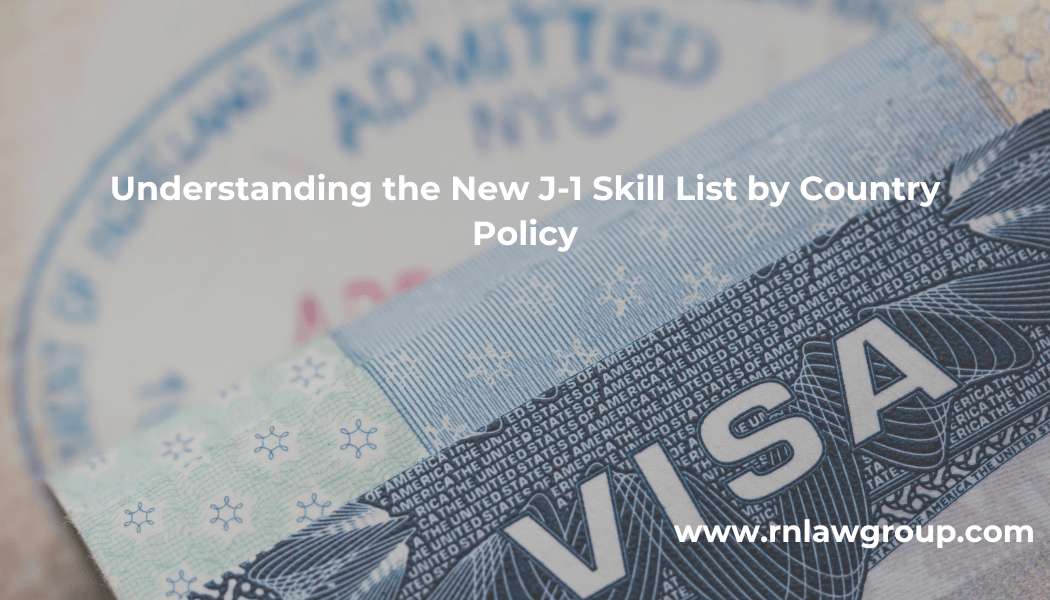
Understanding the New J-1 Skill List by Country Policy
The J-1 visa is a nonimmigrant visa that allows individuals to participate in cultural exchange programs, including research, teaching, training, and other professional development activities, in the United States. This visa category is popular among international students, scholars, and professionals seeking short-term opportunities to expand their expertise and cultural horizons.
One of the unique aspects of the J-1 visa is the two-year home-country physical presence requirement. This requirement means that certain J-1 visa holders must return to their home country and reside there for two years before they can apply for certain immigration benefits, such as an H-1B visa, an L visa, or permanent residency (green card).
This requirement is tied to the Exchange Visitor Skills List, a country-specific list that identifies fields of specialized knowledge and skills that are deemed essential to the development of the J-1 holder’s home country. If the field in which the J-1 visa holder trained or worked appears on this list, they are subject to the two-year requirement.
A recent update to the Skill List policy has created significant changes in how this requirement is applied, potentially benefiting many J-1 visa holders.
What Is the Two-Year Home-Country Service Requirement?
The two-year home-country physical presence requirement under Section 212(e) of the Immigration and Nationality Act (INA) ensures that exchange visitors contribute their newly acquired skills to their home country’s development.
J-1 visa holders subject to this requirement are not eligible to:
- Apply for an H, L, or K visa.
- Adjust their status to lawful permanent residents in the United States.
However, this requirement can be waived in certain circumstances, including:
- No Objection Statement: A waiver is granted if the home country’s government provides a formal statement indicating it does not object to the J-1 visa holder remaining in the U.S.
- Exceptional Hardship: A U.S. citizen or lawful permanent resident spouse or child of the J-1 holder would suffer exceptional hardship if the requirement is enforced.
- Persecution: The J-1 holder fears persecution in their home country.
- S. Government Agency Request: A U.S. federal agency requests a waiver, asserting that the J-1 holder’s continued presence in the U.S. is in the national interest.
What Is the New Skill List Policy?
On December 09, 2024, the U.S. Department of State updated the Exchange Visitor Skills List for the first time in over 15 years. This policy revision has adjusted the criteria and specific skills included on the list, significantly impacting J-1 visa holders from many countries.
Key changes in the new policy include:
- Modernization of Skills: The revised list reflects updated economic and technological priorities for different countries, ensuring alignment with global workforce trends and local developmental needs.
- Reduction in Applicability: Many fields of study or professional categories have been removed from the list for several countries, reducing the number of J-1 visa holders subject to the two-year home-country residency requirement. Notably, many countries were removed entirely from the list, exempting their citizens from the two-year requirement. This includes major source countries for J-1 visa holders, such as India, China, and South Korea.
- Greater Flexibility for Waivers: In some cases, the revised list may make it easier for individuals to pursue a waiver or bypass the requirement entirely.
Who Will Benefit from the New Policy?
The updated Skill List policy benefits J-1 visa holders in various ways, including:
- Professionals in Non-Critical Fields:
- J-1 visa holders whose fields are no longer on the updated Skill List may not be subject to the two-year home-country residency requirement, giving them greater flexibility to pursue other U.S. visa options.
- Countries with Reduced Lists:
- Nationals of countries that now have a shorter Skill List will face fewer restrictions, allowing them to transition more easily to long-term opportunities in the U.S. or other countries.
- Aspiring Immigrants:
- Those seeking to adjust their status to permanent residency or switch to employment-based visas like H-1B will benefit significantly if their skills are no longer deemed essential under the new policy.
- High-Skilled Foreign Talents:
- Highly skilled foreign professionals who were educated in the U.S. will find it easier to stay and work in the country, contributing their expertise to the U.S. economy and innovation sectors. This change also encourages potential high-skilled foreign talents to consider the U.S. as a destination for research and education, knowing they will have a more visible and viable path to stay and contribute after completing their J-1 program.
How to Determine Your Eligibility Under the New Policy
To understand whether the new policy applies to you:
- Review the Updated Skills List: Check the revised Exchange Visitor Skills List for your home country. The U.S. Department of State’s website provides the updated list, categorized by country and field of expertise.
- Consult an Immigration Attorney: Immigration law is complex, and an experienced attorney can help determine whether the new policy impacts your situation and advise on waiver eligibility.
- Check for Waiver Options: If your field remains on the Skill List, you may still explore waiver options, such as obtaining Advisory Opinions with DOS.
Conclusion
The recent updates to the J-1 Exchange Visitor Skills List represent a significant shift in how the two-year home-country residency requirement applies.
By modernizing the list and narrowing its scope, the U.S. Department of State has opened new opportunities for J-1 visa holders to advance their careers and immigration goals.
Whether you are directly impacted by the new policy or considering your waiver options, it is crucial to stay informed and seek expert guidance to navigate these changes effectively.
By: Jiaqi Ji, Associate Attorney
Jiaqi Ji is an Associate Attorney at Reddy Neumann Brown PC who primarily focuses on employment-based non-immigrant visa cases. Jiaqi was born and raised in China, fluent in both English & Chinese. She came to the United States for higher legal education and went through the employment-based immigration process with her spouse. Jiaqi earned her Juris Doctor from George Washington University Law School.

